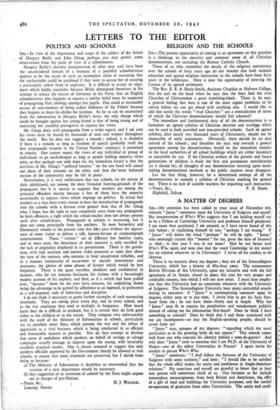POLITICS AND SCHOOLS
LETTERS TO THE EDITOR
SIR,—In view of the importance and scope of the subject of the letters of Margery Reilly and John Gloag, perhaps you may permit some observations from the point of view of a schoolmaster.
Margery Reilly's alarmist interpretation of what may well have been the unconsidered remark of a moment of a youthful schoolmistress appears to be the result of such an incomplete chain of reasoning that the uncharitable could be pardoned if they were to accuse her of essaying a particularly callow form of sophistry. It is difficult to accept an argu- ment which baldly concludes because Hitler denounced financiers in his attempt to seduce the masses of Germany to his Party, that an English schoolmistress who happens to express a similar belief must be suspected -of propagating Nazi ideology amongst her pupils. One could as reasonably accuse all non-smokers of being ardent followers of the Fiihrer because they happen to share his dislike for nicotine. As far as can be ascertained from the information in Margery Reilly's letter, the only charge which could be brought against her young friend is that of being young and of exercising her youthful prerogative to express her views.
Mr. Gloag deals with propaganda from a wider aspect, and I am sure his views must be shared by thousands of men and women throughout the world. But he does not suggest a remedy ; indeed, it is doubtful if there is a remedy as long as freedom of speech (probably itself the best propaganda weapon in the United Nations' armoury) is permitted to remain. One cannot expect the views of any individual or group of individuals to go unchallenged as long as people holding opposite views exist, so that perhaps our only hope for the immediate future is that the activities of Mr. Gloag's " political fanatics " on the one hand will cancel out those of their extreme on the other, and then the 'more balanced section of the community may be left in peace.
Nevertheless, it is very unfortunate that our schools, by the nature of their inhabitanti, are among the most favoured hunting-grounds of the propagator, but it is untrue to suppose that teachers are among the principal offenders merely because a few of them have the temerity occasionally to express views which impinge on politics. In actual fact teachers as a class have every reason to hate the introduction of propaganda into the schools with a fervour even greater than that of Mr. Gloag who, I hope, has the right to turn completely away from any propaganda he finds offensive, a right which the school-teacher does not always possess until after school-hours. Propaganda in schools is increasing, but it does not come principally from the teachers. In most Secondary and Elementary schools at the present time few days pass without the appear- ance of some visitor to deliver a talk, lantern-lecture or cinematograph entertainment. These " visitors" are of different but familiar types, and in most cases the dreariness of their material is only excelled by the lack of originality displayed in its presentation There is the gentle- man, with lady assistant and lantern slides prepared at some date about the turn of the century, who narrates in loud unaspirated syllables, and in a manner reminiscent of excursions to ancient monuments and museums, the glories of some phases of history which would be best forgotten. There is the great traveller, ebullient and confidential in manner, who for ten minutes fascinates his victims with a becomingly modest account of his exploits, and then, as if a switch had been pulled over, " lectures " them for the next forty minutes, his underlying theme being the advantage to be gained by adherence to an imposed, in preference to a self-imposed, code of behaviour and discipline.
I do not think it necessary to quote further examples of such nauseating interludes. They are taking place every day, and in every school, and as the war continues they tend to multiply in frequency. How much harm they do is difficult to estimate, but it is certain they do little good either to the children or to the nation. They compare very unfavourably with the work of the Ministry of Information in schools, particularly via its excellent short films, which present the war and the defeat of aggression as a vital business which is being conducted in as efficient and honourable manner as possible. Nor do they attempt to develop that sense of usefulness which speakers on behalf of savings or salvage campaigns usually manage to impress upon the young, with invariably excellent practical results. One is almost tempted to suggest that only speakers officially approved by the Government should be allowed to visit schools, to ensure that some standards are preserved, but I shrink from doing so because: • (a) The Ministry of Information is doubtless so overworked that the creation of a new department would be necessary.
(b) Any suggestion of an extension of control by the State might expose me to charges of pro-Nazism.


























 Previous page
Previous page